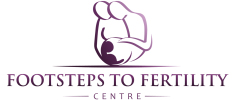Ovulation Induction
If a woman experiences no signs of ovulation and is not ovulating by herself then ovulation induction may be required. 30 to 40% of infertile women have problems with ovulation.
An egg has to be released from the ovary each month in the middle of the cycle to have the opportunity to be fertilized in the tube and subsequently implant in the uterus to develop into a pregnancy.
In many cases, a woman may have perfectly healthy eggs, but for a variety of reasons, she is simply unable to release those eggs. Ovulation induction is an infertility treatment designed to stimulate the production and release of multiple eggs.
At Footsteps To Fertility Centre our approach focuses on helping you navigate the journey and make your dreams of parenthood a reality.
Who is suitable for ovulation induction with fertility drugs?
Approximately one-quarter of all fertility problems can be linked to irregular ovulation. For this reason, ovulation induction is usually the first infertility treatment that we recommend for couples who are experiencing problems conceiving.
Who is ovulation induction recommended for?
- Women with unexplained infertility.
- Women with long, irregular, or infrequent cycles.
- Women who are not spontaneously ovulating.
- Couples with no male-factor infertility.



Causes of Ovulation Failure
There are many possible reasons why women may not ovulate regularly. Some women have a signaling problem between the brain and the ovaries, meaning that the normal hormone pathways do not operate effectively. This results in no signs of ovulation, irregular, rare, or absent ovulation.
This is common in women who exercise at a very high level and in underweight women. It is also common in women who engage in shift work, such as flight attendants.
Some women have polycystic ovarian syndrome (PCOS), a very common hormonal condition associated with long cycles or infrequent or absent periods, the excess activity of some hormones.
Other hormonal imbalances may also cause irregular ovulation, such as abnormalities of prolactin secretion or of thyroid function.
Another serious cause of ovulation failure is premature menopause. This may be temporary or permanent. When the ovaries have exhausted their supply of eggs, this usually results in premature menopause. This condition will not respond to ovulation induction medication and your fertility specialist may discuss the use of donor eggs.
There may be a significant problem within the ovaries with the development of premature ovarian failure and damage to the little eggs and follicles. This can be temporary or permanent and is the only sort of ovulation problem which is not helped by the use of ovulation induction medications.
The Ovulation Induction Process
Assessment
Your fertility specialist will assess your ovulation cycle with blood tests to measure hormone levels at specific stages of your cycle, and an ultrasound to see the development of follicles in the ovaries and the thickness and appearance of the uterus lining.
Stimulation
Your ovaries are stimulated with medications to promote the growth of follicles containing eggs. Your specialist will discuss with you the most appropriate medication or combination of medications for your situation.
Monitoring
Your cycle is monitored very closely with ultrasounds and/or blood tests to check the number and size of follicles developing, this is essential to reduce the risk of multiple pregnancies.
Timed intercourse or artificial insemination
Near the time of ovulation, your specialist will advise the most appropriate day to have sexual intercourse to maximize your chance of pregnancy or perform intrauterine insemination.
How effective is ovulation induction?
The goal of ovulation induction is to increase a woman’s chances of conceiving a child.
Usually, ovulation induction is one of the first treatments used for infertility because it is noninvasive compared with other fertility treatments, such as IVF.
It can be achieved with clomiphene citrate, injected fertility drugs, or a combination of both.
For more severe cases of anovulation or other causes of infertility, ovulation induction can also be an effective treatment in conjunction with IVF, intrauterine insemination (IUI) and other holistic treatments.
Book Your
Appointment today!
Make an Appointment


